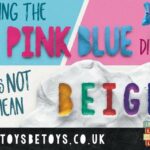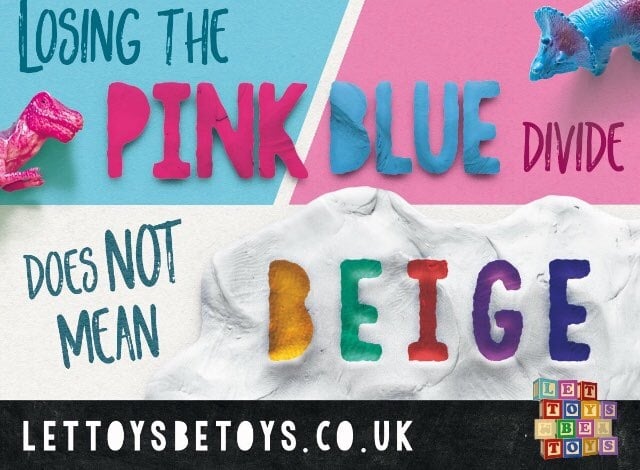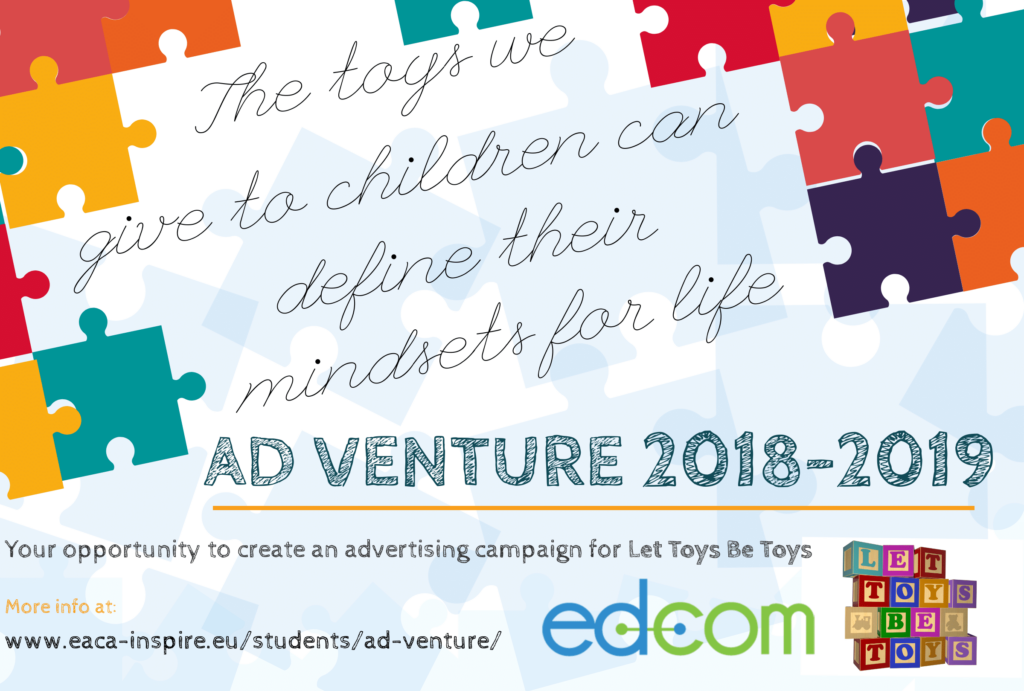As a parent, godparent, sibling or a friend who has ever given a toy as a gift to a child, you probably remember the smile that it brought to their faces. Besides joy and excitement, toys can contribute to successful childhood development, improved self-esteem, creativity, social skills and even help with the expression of emotions.
Of course, not every gift-giver considers the long-term consequences of toys on children. Often, retail space, manufacturers’ toy catalogues and other forms of advertising shape the ultimate purchase decision. Adverts provide an indication of products that are available in the retail market and are designed to guide the consumer in the buyer decision process. But what kind of options and images do they provide, and which attitudes do they convey?
One direction that toy marketing for children is headed to these days is promoting some toys as only suitable for girls and others only for boys. Pink for girls, blue for boys. Cars, building blocks and technical equipment for boys. Dolls, makeup sets and ponies for girls. Toys that cause adults to say: ‘you’re a clever boy’ versus ‘you’re a pretty girl’. This type of categorising could risk limiting the skills that children will learn in the future in addition to the way they will perceive themselves and the world around them.
International commitments
As a member of different industry initiatives such as the ‘Responsible Advertising and Children’ programme, which brings together 20 brands, agencies and media for
quarterly meetings in Brussels, EACA is committed to boosting ethical and stereotype-free advertising for children at a European level.
EACA is also supporting the mission of the international ‘Unstereotype Alliance’ of the United Nations Entity for Gender Equality and the Empowerment of Women, which aims at using advertising as a force for good to drive positive change, while seeking to eradicate harmful gender-based stereotypes. Through its strong network, EACA wants to make a contribution to their cause and help make a difference. It is important that children will be able to shape their social norms and values in a neutral environment.
Ad Venture Student Competition
Through its strong network, EACA approached the issue by making stereotyped toy marketing as the central theme of this year’s Ad Venture Student competition organised together with its European Institute for Commercial Communications Education (edcom). With over 55 academic institutions from 20 European countries as members of the network, edcom strives to promote excellence in commercial communications education and further exchanges between academia and the advertising industry. This relationship currently manifests itself through student competitions, academic exchanges, European networking meetings, and many other projects on a Pan-European scale.
One of these successful products, is the Ad Venture Student Competition, which is a pan-European contest that challenges communications students to develop an advertising campaign for a real client. Running for the 11th time in a row, the competition allows students to put their skills to the test and experience the communications industry in real life. The top campaigns will even have a chance to be supported by the client and run live.
Over the years, the competition has welcomed clients such as Amnesty International, the European Space Agency, the European Commission, and many others. Previous editions have received over 400 students submitting between 70-90 campaigns each year, providing the client a wealth of creative ideas to work with.
Let Toys Be Toys
This year’s client, Let Toys Be Toys, is a grassroots campaign that started on social media in late 2012. Set up by concerned parents, the campaign kicked off with a simple task for the toy and publishing industries: stop limiting children’s interests by promoting some toys as only suitable for girls, and others only for boys.
The volunteer-based organisation has so far succeeded to convince all retail stores in the UK market to remove ‘toys for girls’ and ‘toys for boys’ signs between 2012 and 2016 and are witnessing a similar positive trend in online webstores. What’s more, they have acquired a follower’s base of over 34.800 followers on Twitter and are on the path to continue to grow their outreach and impact on consumers, retailers and manufacturers.
In cooperation with the Ad Venture Student Competition, Let Toys Be Toys wishes to focus on reaching parents who don’t think gendered marketing is a problem and are not engaged with making a change for their own children. The ideal campaign should make the target audience aware, understand and care about why gender stereotyped marketing to children matters. The objective of the campaign is to move towards a situation where offering boys and girls a free choice of toys becomes a social norm. The final goal is to make parents understand that offering the widest range of play experiences to all children irrespective of their gender ensures the best chance for boys’ and girls’ learning opportunities and equalities in life.

The submitted entries will be assessed in three rounds by a broad base of judges, comprised of academics, advertising professionals and client representatives from across Europe. The three finalist teams will have the opportunity to present their campaign during the edcom Member’s Meeting in May 2019 to a senior judging panel of two academic members, two industry professionals and two client representatives. The winning team will be rewarded with travel, accommodation and a ticket to the Cannes Lions International Festival of Creativity in June 2019.
However, the real award for students is to see their creative ideas turn into real campaigns! Both edcom and Let Toys be Toys are looking forward to engaging with the winning team to explore opportunities to make that happen in 2019.
For more information about the competition please visit our website or contact us at inspire@eaca.eu.



